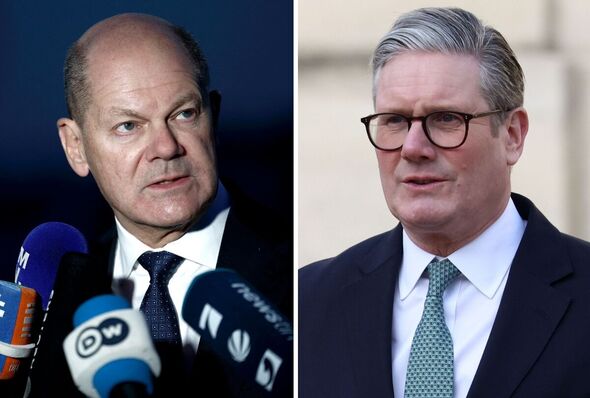Germany has rejected Sir Keir Starmer’s proposal to deploy European troops in Ukraine as part of a peace deal.
The Prime Minister said he would be prepared to send peacekeeping troops to Ukraine, but some present at a meeting of European leaders in Paris wanted to resist discussing any European force being used to monitor a ceasefire.
German Chancellor, Olaf Scholz, said the suggestion was “completely premature”, “highly inappropriate” and he was “a little irritated” by Sir Keir’s proposal.
Sir Keir, speaking after the emergency summit, warned allies – including Britain – will have to “take responsibility” for Europe’s security in light of a radically changed US foreign policy.
He said countries must commit to bolstering both spending and capability as Ukraine‘s fate has become an “existential question” for Europe.
Mr Scholz’s rejection of Sir Keir’s proposal came as US Secretary of State Marco Rubio led a delegation to Saudi Arabia for discussions with Russian officials which will look to seek an end to the fighting.
Ukrainian President Volodymyr Zelensky said earlier on Monday that Ukraine has not been invited to the talks and will not accept the outcome if it is not involved, amid fears that Kyiv will remain excluded from discussions.
Senior US officials on their first visit to Europe last week left the impression Washington was ready to embrace Moscow while cold-shouldering many of the United States’ old European allies.
Mr Scholz, left the Paris early as divisions emerged about the creation of a European peacekeeping force to police any ceasefire between Russia and Ukraine.
Germany, Poland and Spain all voiced a reluctance to send troops to Ukraine as part of a peace deal while the UK, France and Sweden spoke in favour.
Mr Scholz told reporters after leaving the talks: “It is completely premature and the completely wrong time to be having this discussion now. I am even a little irritated by these debates.”
He insisted discussions on possible European troop deployments were being held “over the heads of Ukrainians” about the outcome of peace talks which “haven’t even started”.
The German chancellor added: “This is highly inappropriate, to put it bluntly and honestly – we don’t even know what the outcome will be.”
Meanwhile, British Transport Secretary Heidi Alexander said on Tuesday that MPs would get a vote before UK troops could be sent to Ukraine.
She told Times Radio: “It is my understanding that before any troop deployment, it would be normal, if circumstances allow, for Parliament to be consulted. But, as I say, I do think that we are some way away from this at the moment.”
Ms Alexander was earlier asked if Britain’s Armed Forces would be deployed for peace-keeping in Ukraine without the backing of other European countries.
After insisting such talks were in the very early stages, she said: “The Prime Minister has been clear to date that he sees that partnership with the US as being absolutely essential, that any security guarantee must be worked through both with our European allies and with America.”
Her comments come after Russian Foreign Minister Sergey Lavrov and Vladimir Putin’s foreign affairs adviser Yuri Ushakov arrived in the Saudi capital, Riyadh, on Monday night. Ushakov said the talks would be “purely bilateral” and would not include Ukrainian officials.
State Department spokesperson Tammy Bruce said US Secretary of State Marco Rubio, national security adviser Mike Waltz and Special Envoy Steve Witkoff will meet the Russian delegation.
